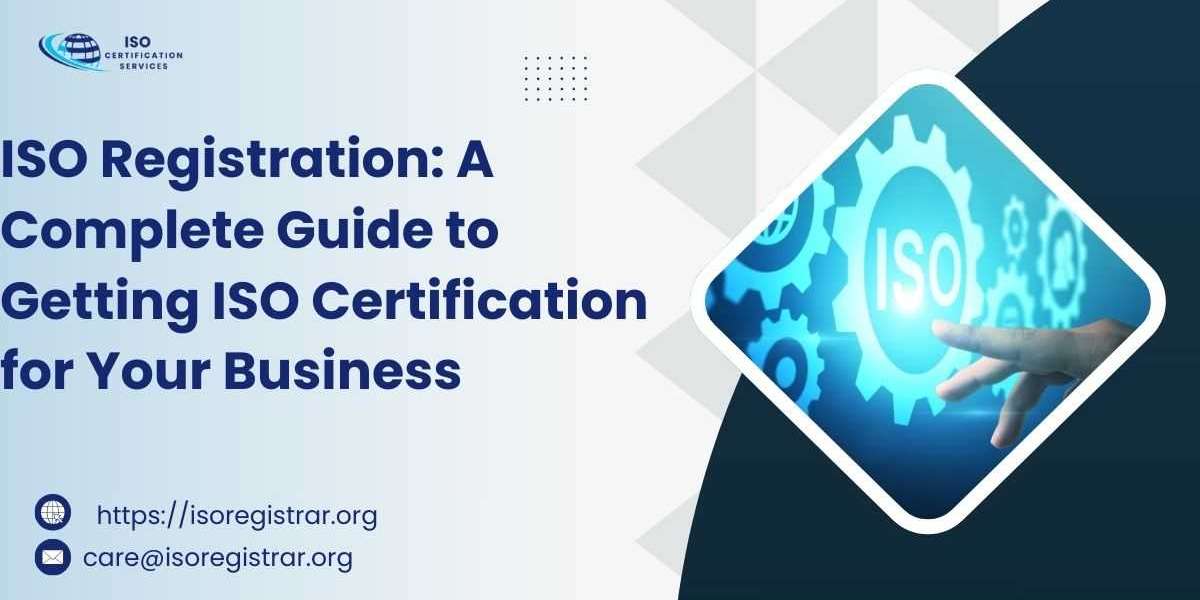In today's competitive business environment, quality management and continuous improvement are essential for sustaining growth and gaining customer trust. One of the most effective ways to showcase your commitment to quality is by obtaining an ISO Certification. ISO (International Organization for Standardization) certifications are globally recognized standards that help businesses improve their processes, meet customer expectations, and stay competitive in the market.
What is ISO Certification?
ISO Certification refers to the process through which an organization demonstrates that it meets the standards set by the International Organization for Standardization (ISO). ISO is a non-governmental international body that develops and publishes standards for various industries and sectors. These standards provide a framework for organizations to follow to ensure consistent quality, safety, efficiency, and customer satisfaction.
There are numerous ISO standards covering a wide range of business functions. The most common and widely recognized include:
- ISO 9001 – Quality Management Systems
- ISO 14001 – Environmental Management
- ISO 45001 – Occupational Health and Safety Management
- ISO 22000 – Food Safety Management
- ISO 50001 – Energy Management
- ISO 27001 – Information Security Management
Each ISO standard provides specific guidelines on how businesses can operate in a more structured, efficient, and compliant way, ensuring the highest standards of quality and performance.
Why is ISO Certification Important?
ISO Certification is a valuable asset for any organization, whether you’re a small business or a large corporation. Here’s why ISO registration is critical for your business:
1. Increased Credibility and Trust
ISO certification serves as a proof that your organization adheres to internationally recognized standards. This increases your credibility and builds trust with your customers, suppliers, and stakeholders. Being ISO certified assures them that your products or services meet the required quality standards.
2. Competitive Advantage
In many industries, having ISO certification is a prerequisite for securing contracts or entering certain markets. ISO standards help businesses stay ahead of their competitors by enabling them to offer better products, higher efficiency, and improved customer service. Customers often prefer to work with ISO-certified companies because it guarantees reliability and quality.
3. Improved Efficiency and Reduced Costs
ISO standards provide organizations with a structured approach to managing processes. By following these standards, businesses can optimize their operations, streamline workflows, and reduce inefficiencies. This not only leads to cost savings but also improves the overall quality of products and services, helping you meet customer expectations.
4. Better Risk Management
ISO standards focus on identifying and managing potential risks to business operations. Implementing these risk management practices helps organizations mitigate the impact of unforeseen challenges, such as supply chain disruptions, environmental impacts, or safety hazards, ensuring business continuity.
5. Legal and Regulatory Compliance
ISO certifications can also help businesses meet legal and regulatory requirements. By following ISO standards, companies ensure that their operations comply with national and international regulations, thus reducing the risk of legal issues and fines.
6. Employee Engagement and Satisfaction
ISO certification encourages a focus on process improvement, quality, and customer satisfaction. This creates a positive work environment where employees are motivated and engaged in meeting quality standards. The focus on continuous improvement also leads to increased job satisfaction as employees are involved in delivering better results.
Types of ISO Certifications
ISO offers a range of certifications, each designed to address specific needs within different industries. Some of the most widely recognized ISO certifications include:
1. ISO 9001 – Quality Management System (QMS)
ISO 9001 is one of the most common and recognized ISO certifications globally. It focuses on the effectiveness of an organization’s quality management system (QMS). Achieving ISO 9001 certification means your company is committed to consistently delivering high-quality products or services and meeting customer needs.
2. ISO 14001 – Environmental Management System (EMS)
ISO 14001 helps organizations reduce their environmental impact by creating a framework for effective environmental management. Businesses that adopt ISO 14001 are committed to sustainability, minimizing waste, reducing emissions, and complying with environmental regulations.
3. ISO 45001 – Occupational Health and Safety Management
ISO 45001 provides guidelines for managing health and safety risks in the workplace. Certification in this standard helps businesses reduce workplace injuries and illnesses, ensuring that they provide a safe working environment for employees and meet relevant health and safety regulations.
4. ISO 22000 – Food Safety Management System (FSMS)
ISO 22000 is designed for businesses in the food industry, including manufacturers, suppliers, and distributors. This certification helps businesses ensure that their food safety management system complies with international standards, guaranteeing the safety of food products and meeting customer expectations.
5. ISO 50001 – Energy Management System
ISO 50001 focuses on improving energy efficiency within organizations. It helps businesses manage their energy consumption effectively, reduce energy costs, and minimize their carbon footprint. ISO 50001 certification demonstrates a company’s commitment to sustainability and environmental responsibility.
6. ISO 27001 – Information Security Management System (ISMS)
ISO 27001 is an essential certification for businesses handling sensitive data. It provides a framework for managing information security risks and protecting data from unauthorized access, breaches, or theft. ISO 27001 certification assures clients and customers that their data is being handled securely.
The Process of ISO Registration
Achieving ISO certification is not a one-time event; it is an ongoing process that requires commitment from the entire organization. Below is an overview of the general steps involved in obtaining ISO certification:
Choose the Right ISO Standard: Select the ISO standard that fits your business needs and aligns with your goals.
Visit the Certification Portal: Go to the official ISO certification website.
Fill Out the Application Form: Complete the online form, ensuring all details are accurate.
Submit Your Application: Review, submit, and double-check all details.
Payment: After submitting the form, pay the nominal charges.
Certificate Confirmation: A consultant confirms the ISO standard you're applying for.
Receive Your ISO Certificate: Once it’s approved, your ISO certificate will be sent to your registered email.
Benefits of ISO Registration
Achieving ISO certification offers a range of benefits for your business, including:
- Enhanced customer satisfaction by delivering consistent quality and meeting customer expectations.
- Increased marketability by gaining a competitive advantage and attracting more customers.
- Improved organizational efficiency by streamlining processes and reducing wastage.
- Better employee engagement through a structured approach to quality and continuous improvement.
- Compliance with industry regulations and global standards.
NOTE:- Apply for ISO CERTIFICATION 9001 : 2015
Conclusion
ISO Registration and certification are powerful tools for businesses aiming to enhance their operations, improve quality, and increase their competitiveness in the market. The certification process might seem challenging at first, but the long-term benefits of ISO certification far outweigh the initial effort and costs. By following the necessary steps, implementing the right processes, and maintaining compliance, your organization can reap the rewards of ISO certification and establish a reputation for quality and excellence in your industry. Whether you are a small business or a large corporation, ISO certification can open doors to new opportunities, increase customer trust, and ensure your business remains at the forefront of industry standards.


